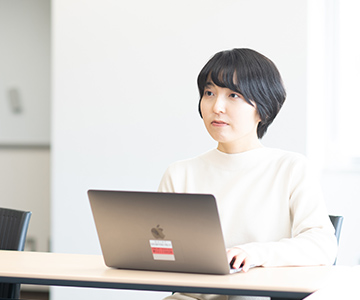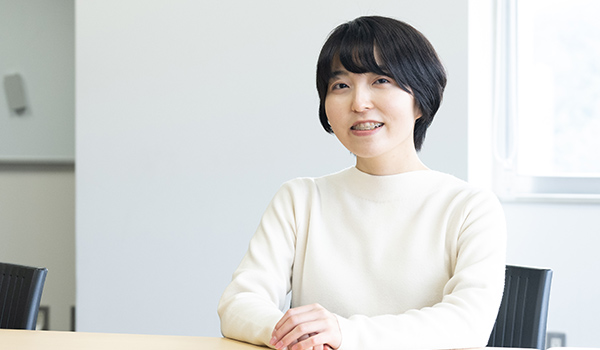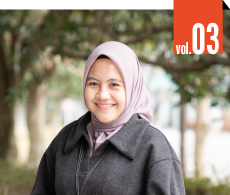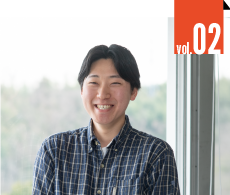
![]()
Miyu Oba
Division of Information Science Laboratory of Natural Language Processing
Grade: 1st year, Master's course
Birthplace: Aichi, Japan
Undergraduate Research: Applied Linguistics
Graduate Research: Natural Language Processing
Before joining NAIST
As an undergraduate, I majored in French culture at a liberal arts college in Nagoya, Japan. In my second year, I decided to study programming to gain some expertise in the field. I knew that I would not be well suited for a career in sales or general work, but for a career where I could learn and keep learning. Around this time, I began to find linguistics interesting in my college classes. When I first enrolled, I was interested in the arts, but I began to develop an interest in science and people. Later, I came across natural language processing as a fusion area of informatics and linguistics. Natural language processing is the use of computers to understand and generate the language that people use humans in everyday life. I was looking for a way to research natural language processing while studying informatics, and I found that in the master's program at NAIST.
I wanted to go to NAIST because there are very few graduate schools of information science that allow liberal arts majors to enter, and because there are many students with backgrounds similar to mine who have enrolled and graduated from NAIST, and there are several alumni specializing in natural language processing who are active at the forefront of their fields. I was also attracted by the fact that the cost of living is very low, about 10,000 yen per month including utilities for the dormitory, from where I can walk to the school building on foot.

Current research and research life
My research theme at the graduate school is AI that handles language, that is, the analysis of language models. Famous applications that use language models are ChatGPT and Siri, which have become popular recently. Language models behave as if they are human, but it is not well understood how language models learn and think, and whether they are the same as humans or completely different. Therefore, my research area investigates the similarities and differences that exist in language acquisition between humans and language models. In March of my senior year as an undergraduate, I attended an online auditing session at the annual meeting of the Association for Natural Language Processing and found a presentation by a researcher whose study is an integration of psycholinguistics (the study of how humans process and acquire language) and the field of natural language processing. After asking him about the details of his work, we were fortunate enough to develop a collaborative research project. Currently, we are focusing on second language acquisition in language models. For example, we are studying how Japanese speakers may easily find it more difficult to learn English than speakers of Western languages, and what the language model looks like.
We use Slack and Notion for communication in our lab. We also use English for general meetings in the lab, except when Japanese people are speaking to each other, English for reading and writing papers for international conferences, and Japanese for domestic conferences. I do not feel that there is any particular difference in treatment among lab members based on their positions. Prof. Watanabe was a researcher at Google Inc. before coming to NAIST, so I think this may be due to the influence of that culture. At the first orientation in the lab, he talked about how diversity is the lifeblood of research and that we should be concerned about inclusiveness and unconscious bias.


I am not usually very conscious of being a woman. Before I enrolled, there were no Japanese women students in my lab, but I applied without any particular concern. On the other hand, when I talked to a female senior student at the open campus who was working on the same topic of natural language processing as the Watanabe lab, she told me that she had also considered the Watanabe lab, but chose this lab because there were no women in the lab. It is true that you may feel more inclined to join a lab if there are people with the same attributes as you.
I am not sure what kind of job I will have in the future, but I feel that software engineers and R&D positions related to our field might be easier for women to have a career in, in the sense that they can easily control their working hours and location. At the company where I interned, there was a culture that encouraged career building while raising children regardless of gender, with male managers, who were also very active as researchers, taking parental leave, and men picking up their children from daycare when they were sick as a matter of course. I think it is a shame that there are so few women in this field.
I registered for the "Understanding Gender Broadens Science!" seminar last November, because of my interest in affirmative action. While it is important to increase the number of women in STEM fields, I was somewhat unconvinced by other universities pushing for admissions exams and quotas for women on the faculty. While the older generation may be disadvantaged if men take the seats and women are disadvantaged, I question whether it is right to affect the younger generation to be affected in order to rectify this situation. NAIST, in particular, is an organization with members from many different demographics. Everyone can be either a majority or a minority. For example, about half of the members in my lab are international students. They mainly use English, and English is the main language of communication in the lab. Some Japanese students can use English and some cannot, and the latter may be a minority. I am a minority in the NAIST community in the sense that I was a liberal arts major and a woman, and a majority in the sense that I was born in Japan. It is difficult to achieve perfect equality of outcome and opportunity for everyone, but I think it is necessary to first understand the situation by attribute, such as which generation and which gender is advantaged or disadvantaged before and after a certain measure is implemented, and to what extent.

Challenges of NAISTs' research environment
I can't think of any particular area where I feel that my attributes hinder my research, and fortunately I enjoy my research activities. However, I have heard that there are some who have problems in some laboratories or research areas, and since NAIST has many people with different attributes, I hope that these interviews will help to spread the word about the thoughts of people with different attributes, such as working people and international students, in addition to the more prominent attributes such as "female".
The procedures regarding grades are complicated, requiring inquiries to the office to confirm that some required credits have been earned, or printing the grade report from the machine next to the office each time to check grades. We hope that a less wasteful system can be established.
I would also like to see more effective communication between the university administration and the students. Many were shocked that the gym on campus was suddenly demolished after being closed for long time period during Covid-19. I had heard that the only reason was that there was no budget to maintain it, but when I checked the university's response at the NAIST President and Students Conversation held a few months later, it was said that all the equipment had exceeded its useful life and there was not enough budget to completely replace it, so it was removed. I think that if this reason had been communicated more widely, more people would have been convinced. I think it would be good if there were more communication between the users and the university about what part of the budget is insufficient.

(March 2023)










